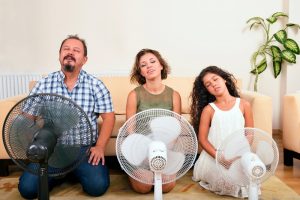 Your air conditioner is an extremely hard worker. No matter what the temperature is, no matter what condition its parts are in, your AC will always strive to cool your home down to the temperature you’ve set on the thermostat.
Your air conditioner is an extremely hard worker. No matter what the temperature is, no matter what condition its parts are in, your AC will always strive to cool your home down to the temperature you’ve set on the thermostat.
Your responsibility as its owner, then, is to make sure that it’s truly up for the job. One way you can do this is by taking into consideration the effects of the outdoor heat.
It Can Worsen a Dirty Condenser Coil
The evaporator coil absorbs warm air from inside the home, but the condenser coil is what sends that warm air into the outdoors.
So if the condenser coil is dirty, here’s the problem: it won’t be able to release that gathered heat. The dust and dirt will act as an insulator, but that won’t stop your AC from doing its best to complete the heat transference cycle.
Now, add excessive heat from the air outside, and you’re compounding the problem. Your AC will have to work several times as hard as usual due to the built-up dirt and dust. This can lead to overheating and the need to call for air conditioning repair services in Frisco, TX.
It Will Double the Work Indoors
We just went over one possible effect of hot air on the outdoor unit, but what about inside?
Although hot air and light won’t be directly beating down on an indoor unit, you can still expect warmer temperatures to make your AC work harder. Your AC works to absorb heat through the evaporator coil, so the excess amount of warm air in your home will only add to this workload. Overall, this means that your AC will have to run longer to ensure a satisfactory indoor temperature.
Warm air will come in through leaks in windows and doors, so you can try to combat this with weather stripping.
It Will Make Older Units Struggle
As you can imagine, an AC working in the heat is being pushed to its limits. For an AC in its prime, and if it has been regularly maintained, it will be able to handle this extra burden. For an older unit, however, this might not be the case.
First of all, older units often have much lower SEER (Seasonal Energy Efficiency Ratio) ratings than what is acceptable by today’s standards. An older AC is already less-efficient to begin with, so adding the summer heat to that mix is only going to drive its efficiency down further.
Second, the unit itself will suffer due to age. Regular maintenance could drastically increase the lifespan of your AC, but at some point, your AC will simply not be able to perform at its normal standards. Usually, you can see this coming if you’re calling in for more and more repairs, at which point replacement would become the most economic decision. Your AC is already experiencing issues due to age, so adding in the heat will make the need for repairs even more frequent.
Beat the heat with Hutchins Plumbing & Air Conditioning. Contact us today for maintenance or repairs. We’ll get it done right… Right now!









